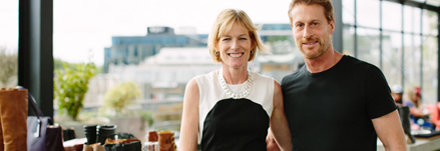
Shane Anselmi turned a worn-out Auckland shoe shop chain into a $60 million Australasian premium footwear brand by ditching the discount model, focusing on his staff, and concentrating on the 80:20 principle (apparently it really does work). Here’s how.
On why the discount strategy sucked
25 years ago my father had a footwear factory in Te Kuiti and 7 or 8 Shoetown discount stores in Auckland which had been successful but which weren’t going well. He asked me to come and work for him and try to turn the stores around.
The majority of the stores were in malls where rents were high and it was tough to make the margins you need to pay those rents. I knew we needed to move to a premium model to maintain our financial viability and went on a factfinding trip to the US which inspired me.
Overland evolved from this and first couple of stores traded very well. We closed the Shoetown stores and opened more Overland.
There were many hard parts including coming up with a name, a store design that would engage, sourcing different product and trying to market and communicate in an entirely different way. Things weren’t easy but our customers responded well to what we were doing and that certainly energized us.
On asking your staff what they think – and finding out stuff you didn’t necessarily want to know
In my early 20s I built and lost several businesses and I was determined to make sure anything I did in the future had a real focus on engaging our people.
As we grew Overland, I was a bit of a one-man band and spent a lot of time working directly with the store managers, involving them in various aspects, including buying for their own stores.
But once we got to around twenty stores I wasn’t able to maintain this and lost a bit of touch with our store managers and the people on the shop floor.
Then about 10 years ago I attended a course for business owners and was intrigued by one guest speaker who specialized in human resources. He mentioned doing a “health check” on your company, and we engaged him to do some 360 degree surveys to see what our people were feeling.
What I learned concerned me. It appeared that the initial joy people had working at Overland was no longer there, so we took on a permanent HR expert.
The first thing she did was ask everyone in the place what they felt the company’s values should be.
I learned having a set of identifiable values are vital for an organisation and really guide people on how to treat other staff, customers and suppliers.
After much consultation we came up with our six values – pro-activity, excellence, accountability, inclusiveness, innovation and integrity.
A lot of companies go through this process, then stick them on a wall or in a draw and forget about them. I’ve made sure we never do this.
We celebrate them on a weekly basis. For example, we ask for values nominations from our 60 stores and support office every week recognizing employees positive actions. Through this, we receive up to 80 nominations weekly, and these are published for all to see.
This immediate recognition and celebration reinforces our key values and those six words are used in our everyday conversations. People love to be acknowledged and recognized for doing the right things – it’s something I feel we do well.
I can only encourage other business owners to open themselves and the rest of their teams up to structured, regular feedback as often as possible. Then listen to it and do something with it.

Shane Anselmi, with wife Louise, also an Overland director
On how the 80/20 Principle actually worked
I remember in the late 1990s we were going through a more difficult patch and I was in London on a buying trip. I came across the book The 80/20 Principle by Richard Koch. I couldn’t put it down and the book was instrumental in changing the way I ran the business.
The 80/20 principle suggests that some things (the 20 percent) have an undue influence on results. You need to identify those and create more of them.
I found that 20% of our shoes could give us 80% of our sales – that’s if we didn’t run out of sizes, so I redoubled our urgency on repeating winners.
I found that 20% of our stores were giving us 80% of our bottom line, so spent a lot more time supporting those.
Additionally, 20% of our supplies seemed to be giving us 80% of our successful collections, so we did more business with them.
Interestingly the 80/20 Principle also holds up in our personal life. We tend to get 80% of our joy in life by spending it with 20% of the people we spend time with. The message here is to spend more time with ones you love, the people who inspire and are good for you, and spend less with the ones you perhaps feel obligated to, who put out a negative energy and who bring you down.
Overland in brief
60 stores:
In New Zealand: 36 Overland, 14 Mi Piaci
In Australia (Melbourne) – 8 Merchant 1948, 2 Mi Piaci
Employees:
Approximately 400 employees in NZ; 50 in Melbourne
Turnover:
2014 (forecasted): approximately $60m




